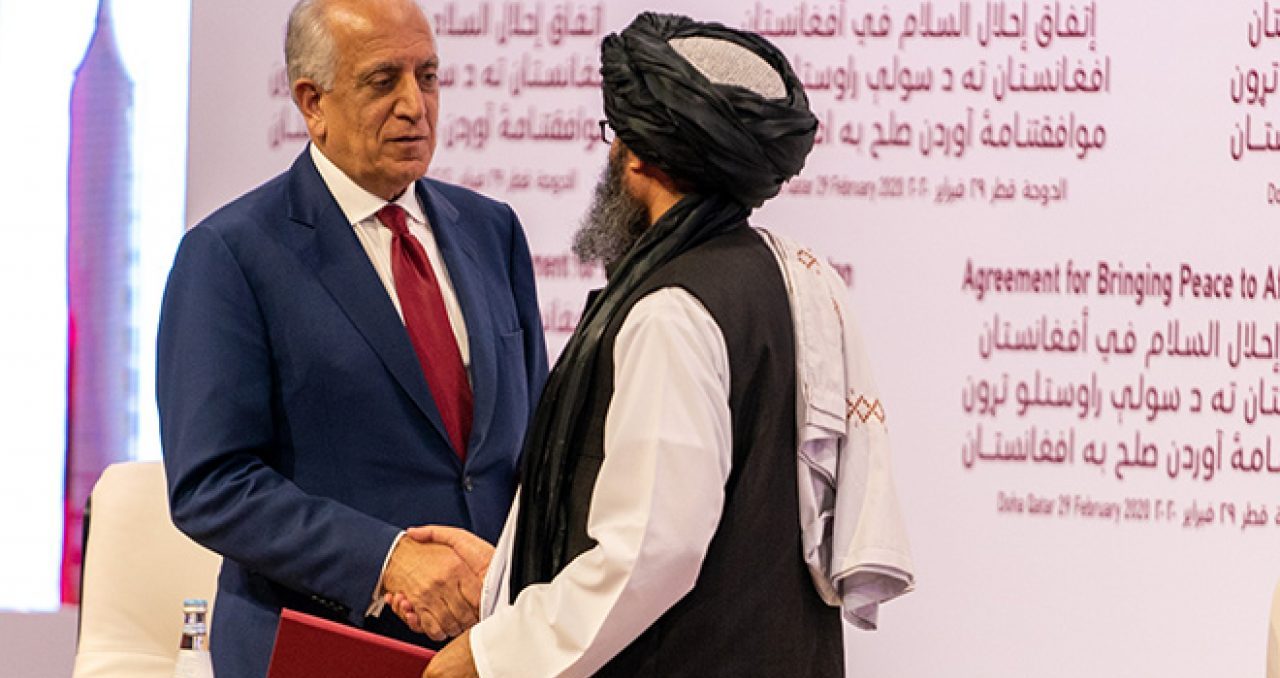Afghanistan’s former president was also blamed for the fall of Kabul last year.
Former US envoy for Afghanistan Zalmay Khalilzad defended the 2020 Doha Agreement that was signed with the Taliban during his stint in office, amid ongoing criticism over the accord.
Speaking to RFE/RL’s Radio Free Afghanistan on Sunday, Khalilzad said the “Doha agreement was historic” and paved the way for the complete US withdrawal from Afghanistan following 20 years of fighting.
At the time, Khalilzad was the US official who signed the agreement in Qatar with the-Taliban’s top negotiator Mullah Baradar, currently Afghanistan’s acting first deputy prime minister of economy.
“It was the result of the change in American policies and the situation on the ground inside Afghanistan,” said Khalilzad, noting that parts of the agreement have yet to be implemented.
Signed under the former US Donald Trump administration, the agreement set 1 May 2021 as the deadline for the foreign troop withdrawal from Afghanistan following the 20-year invasion.
However, the pull out was on the condition that the Taliban halts its support for terrorist organisations.
The deadline was later revised to 11 September by President US President Biden without conditions, who then changed it to 31 August following the Taliban takeover of Kabul.
Khalilzad, who resigned two months after the Taliban took over Kabul on 15 August last year, said another declaration was signed with the former Afghan government to renew its support to the ruling administration.
He also blamed former Afghan President Ashraf Ghani for not abiding by the deal by participating in talks to form a transitional government ahead of the takeover. Khalilzad said the former Ghani administration hoped Biden would ditch the Doha agreement.
“[A transitional government] couldn’t be formed because Ghani fled Afghanistan and the Afghan security forces collapsed,” he said.
Khalilzad said the collapse of the former government was also due to the security forces’ high dependence on US support.
“The bad habit in Afghanistan is that no one accepts responsibility and even don’t accept facts,” he said.
Criticism over the agreement
Ghani had fled Afghanistan to Tajikistan when the Taliban arrived to the outskirts of Kabul, a move that many Afghans saw as a betrayal from their government. The former president maintained that he had to flee the country to avoid bloodshed.
Last week, Ghani criticised Khalilzad as he described the Doha agreement as a “tragedy.” Many Afghans also believe the agreement paved the way for the collapse of the former Afghan administration, accusing Khalilzad of being behind the damage.
In May, the Special Inspector General for Afghanistan Reconstruction (SIGAR) said the accord led to the collapse of the US-trained Afghan security forces as the Taliban made military advances in the country.
“The single most important factor in the [Afghan military] collapse in August 2021 was the US decision to withdraw military forces and contractors from Afghanistan through signing the US-Taliban agreement in February 2020 under the Trump administration,” said SIGAR’s report.
Another recent criticism was made by David Petraeus, the former head of US and NATO forces in Afghanistan and former head of the Central Intelligence Agency (CIA).
“We acquiesced to Taliban demands because the resulting agreement gave us, in the narrowest sense possible, what we wanted: a defined timeline for our departure and a Taliban promise not to attack our forces…in the interim,” Petraeus wrote in The Atlantic last week.
A year since the Taliban militarily seized power, the group and the US have been exchanging blame over their compliance with the deal. This came following the killing of Al Qaeda leader Ayman Al Zawahiri on 1 August in a “precision” US airstrike in Afghanistan.
The Taliban maintains that it had no knowledge of Al Zawahiri’s presence and said his body was not found at the site of the killing.
US crimes in Afghanistan
The US invasion of Afghanistan cost $2 trillion and an exorbitant humanitarian cost, where foreign forces killed at least 71,000 civilians.
The US invasion of Afghanistan, destroyed much of the country’s infrastructure.
A year since the takeover, the US and NATO continue to deflect any blame over the horrors Afghanistan witnessed during the deadly invasion of the country.
Numerous reports by rights groups continue to point to crimes committed by the foreign forces, from torturing civilians to raping women.
The US has also come under fire for what appeared to be an unplanned evacuation.
In September last year, the US Senate grilled Secretary of State Antony Blinken following a second day of interrogation from Republican lawmakers.
Defending Biden’s decision, Blinken said that the US had already prepared itself for the “worst-case scenario” in the country during the spring and summer.
The plans focused on the evacuation of members at the US embassy in Kabul within a 48 hour period while controlling the airport.
An internal State Department memo released on 31 July had also warned of the Taliban’s takeover of Kabul and collapse of the former Afghan government as Blinken declined to hand the Senate Foreign Relations Committee a copy of the documents.







